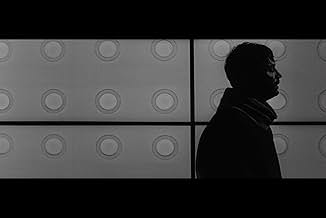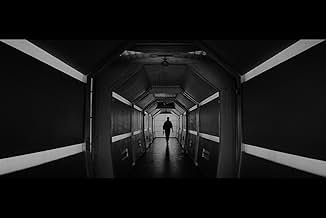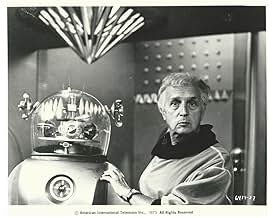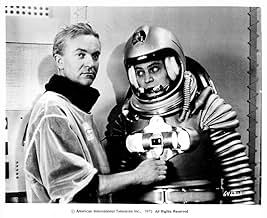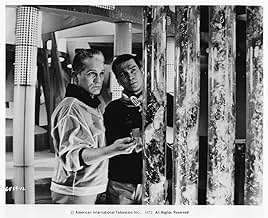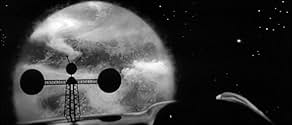Ikarie XB 1
- 1963
- 1 Std. 26 Min.
IMDb-BEWERTUNG
6,9/10
3207
IHRE BEWERTUNG
Füge eine Handlung in deiner Sprache hinzuThe year is 2163. Starship Ikarie XB 1 embarks on a long journey across the universe to search for life on the planets of Alpha Centauri.The year is 2163. Starship Ikarie XB 1 embarks on a long journey across the universe to search for life on the planets of Alpha Centauri.The year is 2163. Starship Ikarie XB 1 embarks on a long journey across the universe to search for life on the planets of Alpha Centauri.
- Auszeichnungen
- 1 wins total
Empfohlene Bewertungen
Written by the same man who wrote Solaris, rather than a science fantasy, space opera, or race movie like many other scifi films of that era (many of which are just as excellent in their own way - see The Sky Calls, Planeta Bur, or Forbidden Planet, for example), Ikarie XB1 (aka Journey to the End of the Universe) is a serious-minded science fiction drama, with element of mystery and suspense.
My rating of 9 out of 10 Stars might be a little exuberant, but that was my reaction to the film. The sets are sumptuous, almost art deco, the black and white cinematography crisp and beautiful to look at, and the acting always competent or better. The score is largely electronic, with some distorted electric guitar, and no orchestral elements.
Ikarie XB1 is so different from a lot of other science fiction cinema being produced at the time that I found it to be a captivating surprise.
My rating of 9 out of 10 Stars might be a little exuberant, but that was my reaction to the film. The sets are sumptuous, almost art deco, the black and white cinematography crisp and beautiful to look at, and the acting always competent or better. The score is largely electronic, with some distorted electric guitar, and no orchestral elements.
Ikarie XB1 is so different from a lot of other science fiction cinema being produced at the time that I found it to be a captivating surprise.
This is an intriguing Czech science fiction film from the early 60's. It's pretty much unknown in the U.S (American - International Pictures dubbed it into English and released it as "Voyage to the End of the Universe" in 1964; it's been seen here only rarely since then).
The movie depicts a group of space travelers on a seemingly endless journey to a new planet. They encounter many traps and dangers along the way (including a derelict spacecraft and a mysterious nebula) but the greatest conflict seems to be psychological: namely, the titanic ambition of a 15-year, trans-galactic voyage pitted against the fragility of the human mind and the relative insignificance of human lives.
The interior sets are lavish -- certainly on a par with "Forbidden Planet" and perhaps even "2001". The level of detail in the spaceship interiors is admirable, and the same can be said for the smartly designed spacesuits.
"Ikarie XB 1" stumbles badly, though, when it comes to the exterior effects work. The spacecraft models are too small to provide much detail, and seem to be propelled through space by dark-colored string. As a result the transitions between interior and exterior shots are somewhat jarring.
All the same, this movie is a very interesting example of mid-century science fiction. It deserves a much wider audience, and it is to be hoped that a restored, subtitled print will one day make the rounds in American art houses. Cross your fingers.
The movie depicts a group of space travelers on a seemingly endless journey to a new planet. They encounter many traps and dangers along the way (including a derelict spacecraft and a mysterious nebula) but the greatest conflict seems to be psychological: namely, the titanic ambition of a 15-year, trans-galactic voyage pitted against the fragility of the human mind and the relative insignificance of human lives.
The interior sets are lavish -- certainly on a par with "Forbidden Planet" and perhaps even "2001". The level of detail in the spaceship interiors is admirable, and the same can be said for the smartly designed spacesuits.
"Ikarie XB 1" stumbles badly, though, when it comes to the exterior effects work. The spacecraft models are too small to provide much detail, and seem to be propelled through space by dark-colored string. As a result the transitions between interior and exterior shots are somewhat jarring.
All the same, this movie is a very interesting example of mid-century science fiction. It deserves a much wider audience, and it is to be hoped that a restored, subtitled print will one day make the rounds in American art houses. Cross your fingers.
Considering that this film was made in 1963, in Czechoslovakia, at a time when so much sci-fi schlok was produced in the spacefaring United States, this film is a rare, welcome sight to the eyes. Intelligently produced and designed, with good character development and good special effects, I miss seeing this film which seems to have been lost in the Great Transition To Video; I know of no distributors for it. It does have its corny moments, but this is excusable in light of the time in which it was made. The ending was unfortunately changed for U.S. viewers, which is a shame; It is the U.S. ending which gets criticized most...I imagine the European ending would have been more in keeping with its originality, and would hope that American International would re-release it in the U.S., with new dubbing (I'm one of those non-purists who can't stand sub-titles...they interfere with the enjoyment of the image. And yes, dubbing CAN be done well, when done RIGHT!). It's been nineteen years since I saw it over the airwaves. I hope it has not vanished; It would be a shame for others not to experience it.
Still relatively unfamiliar to western audiences, Ikarie XB 1 is an example of east European science fiction cinema on a fairly ambitious scale deserving of wider appreciation. Usually it's been only seen in a butchered edition created Stateside - duly shorn of a plot strand, dubbed with a different ending, with a dumb title.
With the benefit of hindsight, a lot of the original seems familiar. With its clean interior ship design, crew neck uniforms all round, glide doors, shiny deck flooring as well as a 15-year mission to seek out new life, Ikarie may have given later pause for thought for a certain Gene Roddenberry. Genre fans will also note that, during the first big set piece, the crew are startled by an unexpected alarm and deviate from their mission to investigate a derelict spacecraft - events which end with a nuclear detonation in space. Add to this the changes wrought by the American bastardisation of Voyage To The End Of The Universe, that included an ending which anticipates Planet of the Apes, as well as its possible inspiration to Kubrick when planning 2001, and Ikarie certainly offers much of interest. Not to mention its own borrowings eg Ikarie's robot Patrick, inspired by Forbidden Planet (1956)
Polák's was also responsible for an intriguing Nazi time travelling movie, with a small cult on its own account, Tomorrow I'll Wake Up And Scald Myself With Tea, made in the late 1970s. Less idiosyncratic than this, one imagines, Ikarie is much more serious in tone, set mostly aboard a roomy spacecraft, crewed by 40, dispatched to discover if there is any life on Alpha Centauri. A feeling of worthwhile isolation permeates this journey, with none of the trivial, trials and stresses one expects from space dramas made closer to home at this time, where mad scientists lurk, robots lumber threateningly or spacewomen defer to their mates. Missing too is the pseudo technical claptrap which lumbers much American SF, then or now. Ikarie's hardware exists mainly in the background, without need of explanation. The film expects us to take its conspicuous 22nd century advances just as seen, being concerned more with sociology than technology.
Ikarie features a harmonious society in miniature, shown in a series of interactions aboard, even down to the calm acceptance of on board pregnancy - an adult theme incidentally completely excised in the American version. In such an hospitable environment, even the mad can be talked round without violence, as in the case of Michael (Otto Lackovic) who, affected by radiation and in a disastrous manoeuvre, wants to turn the ship back to Earth. That the only real threat the crew face is an external one is significant, and also primes the dramatic moment that begins the narrative. A flash-forward to when (infected by the same source, as we learn later), one of the crew is wandering, bewildered and aggressive, through the ship. "Earth is gone," he says. "Earth never existed." But he's not beyond help from his peers. Here the deluded or mad in space are not assumed lost, such as we might see in such recent American films as Event Horizon, but taken back and with promise of cure at that.
Critics have contrasted these shipboard mores to the signs of capitalist degeneracy confronting those who board the 'Tornado', the derelict space station from 1987 unexpectedly encountered en route. Here, amidst the dark clutter of its interior, are found signs of gambling and money, coded elements of capitalist speculation, just as fatal as the death gas and nuclear warheads also there. For those who explore it, the Tornado reflects a place thought left behind, both geographically and politically. "We have discovered the 20th century," says one dismayed crewman. The determined self destruction encountered by those who board the derelict recalls one of TV's original Star Trek shows, and those found died as result of a selfish fight for survival. The signs of a corrupt political system fall exposed with as much horror as does (in a notable moment) the skin off the Tornado captain's face.
This, and then the debilitating effects of rays that emanate from a hitherto unknown black star are the two principal threats facing the crew. How they finally overcome this last hurdle is part of the end of the quest. Without giving too much away, it is sufficient to say that the close of the film, the ship's long anticipated arrival at Alpha Centauri's 'white planet', brings a sequence both uplifting and brief, carrying over the theme of mutually beneficial cooperation. But viewers today may find less interest in the ending than the scenes that have preceded it. It's the Ikarie crew's social or dutiful pairings, even to the point of bringing each other flowers, or taking showers together, which lay at the heart of the film, rather than any encounter of a new civilisation and the socialist message entailed. Whilst in basic narrative terms the 'white planet' brings closure, our attentions have for long been focused elsewhere, in scenes such as the notable dance sequence. Through the hypnotic rhythms of Zdenek Liska's striking score, the astronauts take part in something akin to a weird 22nd century disco, their slow somnambulistic movements reassuring while also slightly disturbing. Reassuring, as we can see the crew reacting together as one social unit, even after the inevitable trials of months in space; disturbing because it is all so emotionless and controlled. Such ambiguous group occasions beg questions we really want answered. Are they really happy? Or does the Earth we thought we recognised in them no longer exist?
The Czech originated disc I have seen offers a splendid widescreen transfer of the movie with English subtitles. Most of the extras are unfortunately not subtitled, but there's a chance to see some sample scenes from the American International version, to give an idea of how the original was changed as well as a stills gallery.
With the benefit of hindsight, a lot of the original seems familiar. With its clean interior ship design, crew neck uniforms all round, glide doors, shiny deck flooring as well as a 15-year mission to seek out new life, Ikarie may have given later pause for thought for a certain Gene Roddenberry. Genre fans will also note that, during the first big set piece, the crew are startled by an unexpected alarm and deviate from their mission to investigate a derelict spacecraft - events which end with a nuclear detonation in space. Add to this the changes wrought by the American bastardisation of Voyage To The End Of The Universe, that included an ending which anticipates Planet of the Apes, as well as its possible inspiration to Kubrick when planning 2001, and Ikarie certainly offers much of interest. Not to mention its own borrowings eg Ikarie's robot Patrick, inspired by Forbidden Planet (1956)
Polák's was also responsible for an intriguing Nazi time travelling movie, with a small cult on its own account, Tomorrow I'll Wake Up And Scald Myself With Tea, made in the late 1970s. Less idiosyncratic than this, one imagines, Ikarie is much more serious in tone, set mostly aboard a roomy spacecraft, crewed by 40, dispatched to discover if there is any life on Alpha Centauri. A feeling of worthwhile isolation permeates this journey, with none of the trivial, trials and stresses one expects from space dramas made closer to home at this time, where mad scientists lurk, robots lumber threateningly or spacewomen defer to their mates. Missing too is the pseudo technical claptrap which lumbers much American SF, then or now. Ikarie's hardware exists mainly in the background, without need of explanation. The film expects us to take its conspicuous 22nd century advances just as seen, being concerned more with sociology than technology.
Ikarie features a harmonious society in miniature, shown in a series of interactions aboard, even down to the calm acceptance of on board pregnancy - an adult theme incidentally completely excised in the American version. In such an hospitable environment, even the mad can be talked round without violence, as in the case of Michael (Otto Lackovic) who, affected by radiation and in a disastrous manoeuvre, wants to turn the ship back to Earth. That the only real threat the crew face is an external one is significant, and also primes the dramatic moment that begins the narrative. A flash-forward to when (infected by the same source, as we learn later), one of the crew is wandering, bewildered and aggressive, through the ship. "Earth is gone," he says. "Earth never existed." But he's not beyond help from his peers. Here the deluded or mad in space are not assumed lost, such as we might see in such recent American films as Event Horizon, but taken back and with promise of cure at that.
Critics have contrasted these shipboard mores to the signs of capitalist degeneracy confronting those who board the 'Tornado', the derelict space station from 1987 unexpectedly encountered en route. Here, amidst the dark clutter of its interior, are found signs of gambling and money, coded elements of capitalist speculation, just as fatal as the death gas and nuclear warheads also there. For those who explore it, the Tornado reflects a place thought left behind, both geographically and politically. "We have discovered the 20th century," says one dismayed crewman. The determined self destruction encountered by those who board the derelict recalls one of TV's original Star Trek shows, and those found died as result of a selfish fight for survival. The signs of a corrupt political system fall exposed with as much horror as does (in a notable moment) the skin off the Tornado captain's face.
This, and then the debilitating effects of rays that emanate from a hitherto unknown black star are the two principal threats facing the crew. How they finally overcome this last hurdle is part of the end of the quest. Without giving too much away, it is sufficient to say that the close of the film, the ship's long anticipated arrival at Alpha Centauri's 'white planet', brings a sequence both uplifting and brief, carrying over the theme of mutually beneficial cooperation. But viewers today may find less interest in the ending than the scenes that have preceded it. It's the Ikarie crew's social or dutiful pairings, even to the point of bringing each other flowers, or taking showers together, which lay at the heart of the film, rather than any encounter of a new civilisation and the socialist message entailed. Whilst in basic narrative terms the 'white planet' brings closure, our attentions have for long been focused elsewhere, in scenes such as the notable dance sequence. Through the hypnotic rhythms of Zdenek Liska's striking score, the astronauts take part in something akin to a weird 22nd century disco, their slow somnambulistic movements reassuring while also slightly disturbing. Reassuring, as we can see the crew reacting together as one social unit, even after the inevitable trials of months in space; disturbing because it is all so emotionless and controlled. Such ambiguous group occasions beg questions we really want answered. Are they really happy? Or does the Earth we thought we recognised in them no longer exist?
The Czech originated disc I have seen offers a splendid widescreen transfer of the movie with English subtitles. Most of the extras are unfortunately not subtitled, but there's a chance to see some sample scenes from the American International version, to give an idea of how the original was changed as well as a stills gallery.
This is for sf-film completists. It seems to fill a gap between the late-50's style of sf movie and the forever-after effects of Star Trek and Kubrick's "2001." The only version you're likely to see is the American International release. The Encyclopedia of SF says the original film is in color, but AI's print is B&W, probably to save costs on the number of prints they may have made from a film I suspect they got for little money in the first place.
The story is about a big "community" sized spaceship making a long journey to "the green planet." Another reviewer said the ship was faster than light, but a couple of references to time-dilation effects in the dialog make it more likely that the ship was a near-lightspeed model. This has an influence on the spooky atmosphere that pervades the whole film, making the crew/community highly insular, as they realize they are cut off completely from the lives they have left behind.
The sfx are slightly better than Dr. Who episodes of similar vintage, with a couple of really good spacesuits and an unusual design for the ship itself. There's also a very, very neat shot of the ship in orbit around its destination that is a dead ringer for a similar moment in "Alien," and quite effective (in both films), in a way that most movies about spaceships seem to forego.
Still, the story rambles and seems kind of shallow. The sets and sfx aren't bad, but don't make up for the weak script. I recommend this for true lovers of the form (as I am), because you just wouldn't want to be left wondering what might have been going on in sf films, even east European ones, in the early '60s. Here's your answer.
The story is about a big "community" sized spaceship making a long journey to "the green planet." Another reviewer said the ship was faster than light, but a couple of references to time-dilation effects in the dialog make it more likely that the ship was a near-lightspeed model. This has an influence on the spooky atmosphere that pervades the whole film, making the crew/community highly insular, as they realize they are cut off completely from the lives they have left behind.
The sfx are slightly better than Dr. Who episodes of similar vintage, with a couple of really good spacesuits and an unusual design for the ship itself. There's also a very, very neat shot of the ship in orbit around its destination that is a dead ringer for a similar moment in "Alien," and quite effective (in both films), in a way that most movies about spaceships seem to forego.
Still, the story rambles and seems kind of shallow. The sets and sfx aren't bad, but don't make up for the weak script. I recommend this for true lovers of the form (as I am), because you just wouldn't want to be left wondering what might have been going on in sf films, even east European ones, in the early '60s. Here's your answer.
Wusstest du schon
- WissenswertesThe music played on piano after the derelict ship explodes is "Part One: Introduction" from "King David", aka "Le Roi David," composed by Arthur Honegger.
- Alternative VersionenSPOILER: For the American release, titled "Voyage to the End of the Universe," American International Pictures cut the film up, changing a number of things:
- Approximately 26 minutes of footage were removed (including a sequence in a man-made flying saucer carrying dead capitalists, nerve gas and an atomic bomb).
- The story was changed substantially, the ship's flight direction reversed (making it an alien ship traveling to Earth), and the Statue of Liberty pasted into the final shot.
- The cast and staff's names in the credits were altered significantly to look like English.
Top-Auswahl
Melde dich zum Bewerten an und greife auf die Watchlist für personalisierte Empfehlungen zu.
- How long is Voyage to the End of the Universe?Powered by Alexa
Details
Box Office
- Weltweiter Bruttoertrag
- 2.130 $
- Laufzeit
- 1 Std. 26 Min.(86 min)
- Farbe
- Sound-Mix
- Seitenverhältnis
- 2.35 : 1
Zu dieser Seite beitragen
Bearbeitung vorschlagen oder fehlenden Inhalt hinzufügen


